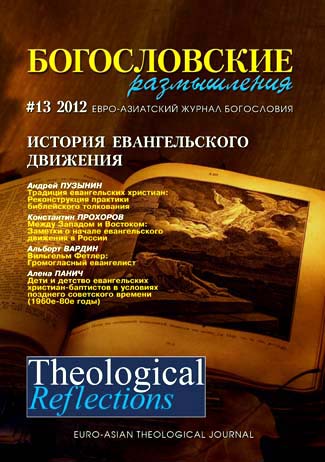Children and Childhood among Evangelical Christians-Baptists During the Late Soviet Period (1960s-1980s)
Keywords:
Евангельское движение в России, Дети из семей евангельских христиан-баптистовAbstract
This paper explores strategies and practices of the Christian upbringing of children with in the Evangelical Baptist community during the late Soviet period (1960s11980s). The author depicts three aspects of childhood relationships: the church (congregation), the family and Soviet society. The Evangelical Baptist community treated children as valuable «small followers of Christ.» At the same time, efforts were aimed at bringing children to conversion. The main direction of work with children was to accustom them to prayer and reading Holy Scripture. In their families children were brought up with an understanding of their mother's and father's role differences. The Soviet state strove to limit opportunities for believers and congregations to bring up children in an atmosphere of Christian spirituality. The persecution of parents for violating Soviet religious legislation also influenced their children. Generally, the children of believers were raised in conditions of competition between Evangelical and Soviet atheistic values and often became the subject of manipulation and the struggle for authority and domination. All these circumstances created around them an atmosphere of anxiety and distrust toward the «external» or «worldly» society, and also increased their personal sense of significance.Downloads
How to Cite
Issue
Section
License
Copyright (c) 2020 Olena PANYCH

This work is licensed under a Creative Commons Attribution-NonCommercial 4.0 International License.
All articles published in the Journal are distributed under a Creative Commons Attribution-NonCommercial 4.0 International License
By submitting an article for publication in Theological Reflections: Eastern European Journal of Theology the author grants the editors the right to publish the article and distribute it in electronic and print form.
The author reserves all copyrights and the right to use the materials of the article in whole or in part for educational purposes, to write his own dissertations, to prepare abstracts, conference reports, oral presentations, etc., as well as post electronic copies of articles (including the final electronic version downloaded from the journal’s official website) on non-commercial web-resources without the consent of the editorial board and founders.



